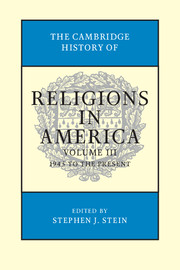Book contents
- Frontmatter
- SECTION I THE POSTWAR RELIGIOUS WORLD, 1945 AND FOLLOWING
- SECTION II CONTROVERSIAL ISSUES IN TRANSITIONAL TIMES
- 7 Secularization in American Society: A Review of the 1960s
- 8 Breaking Silence: Churches and Opposition to the Vietnam
- 9 The Religious Significance and Legacy of the Civil Rights Movement, 1950–1970
- 10 The Kennedy Election: The Church-State Question and Its Legacy
- 11 “Love is the Only Norm”: The New Morality and the Sexual Revolution
- 12 Second Vatican Council
- 13 The State of Israel
- SECTION III THE WORLD’s RELIGIONS IN AMERICA
- SECTION IV RELIGIOUS AND CULTURAL CONFLICT IN AMERICA
- SECTION V NEW AND CONTINUING RELIGIOUS REALITIES IN AMERICA
- SECTION VI CONCLUDING ESSAYS
- Index
- References
8 - Breaking Silence: Churches and Opposition to the Vietnam
from SECTION II - CONTROVERSIAL ISSUES IN TRANSITIONAL TIMES
Published online by Cambridge University Press: 28 July 2012
- Frontmatter
- SECTION I THE POSTWAR RELIGIOUS WORLD, 1945 AND FOLLOWING
- SECTION II CONTROVERSIAL ISSUES IN TRANSITIONAL TIMES
- 7 Secularization in American Society: A Review of the 1960s
- 8 Breaking Silence: Churches and Opposition to the Vietnam
- 9 The Religious Significance and Legacy of the Civil Rights Movement, 1950–1970
- 10 The Kennedy Election: The Church-State Question and Its Legacy
- 11 “Love is the Only Norm”: The New Morality and the Sexual Revolution
- 12 Second Vatican Council
- 13 The State of Israel
- SECTION III THE WORLD’s RELIGIONS IN AMERICA
- SECTION IV RELIGIOUS AND CULTURAL CONFLICT IN AMERICA
- SECTION V NEW AND CONTINUING RELIGIOUS REALITIES IN AMERICA
- SECTION VI CONCLUDING ESSAYS
- Index
- References
Summary
When Norman Morrison set himself on fire in front of the Pentagon in November 1965, Americans reacted with horror and incomprehension. Morrison, a member of the Society of Friends, was despondent over the American escalation of the Vietnam War. A week later, Roger LaPorte, a member of the pacifist organization Catholic Worker, immolated himself at United Nations headquarters. Unlike Morrison, he lived long enough to explain that this was his religious protest against war.
Such actions departed from traditional practices of the historic peace churches (Society of Friends, Jehovah’s Witnesses, Mennonites, and Church of the Brethren) and religious pacifist organizations such as the Catholic Worker and the Fellowship of Reconciliation (FOR), namely, refusal to pay taxes to support the military or accepting conscientious objector (CO) status during wartime. Mainstream Catholic, Jewish, and Protestant denominations, by comparison, had historically supported American entry into wars. What made religious opposition to the Vietnam War different was that the historic peace churches and pacifist organizations were joined by prominent religious leaders such as Rabbi Abraham Joshua Heschel; the Yale chaplain William Sloane Coffin, Jr.; his fellow Presbyterian minister Robert McAfee Brown; the Catholic priests Daniel and Philip Berrigan; and, most famously, Martin Luther King, Jr., Baptist pastor and civil rights leader. Civil rights was their entrance into social protest.
- Type
- Chapter
- Information
- The Cambridge History of Religions in America , pp. 170 - 186Publisher: Cambridge University PressPrint publication year: 2009



